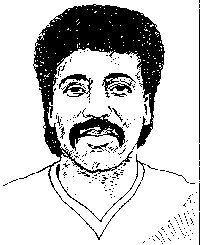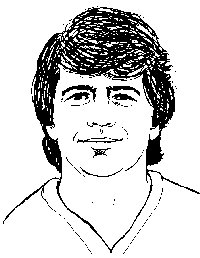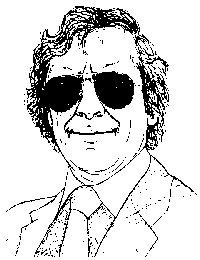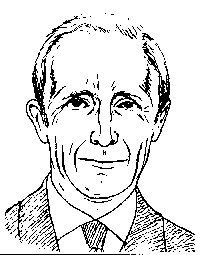
| Henry Hughton |
Proof, if any were needed, that Ron Noades was some way out of touch with the feelings of the supporters came when he announced the name of the new manager: Alan Mullery, without doubt the most unpopular choice one could imagine. Mullery had been manager of the Brighton side which finished runners-up in Division Two to Palace in 1979, and then moved on to Charlton, from where Noades headhunted him after a year. This left Palace's South London neighbours to soldier on under the unknown Lennie Lawrence, for which they must be eternally grateful. The bad blood between Palace and Brighton had been at its worst during Mullery's time on the South Coast, and from the moment his appointment was announced the majority of fans - myself included - were convinced that the Chairman had made a dreadful mistake. Noades obviously saw in Mullery the charisma which Gradi and Kember lacked, and an ego to match his own, but he never for a moment threatened to endear himself to Palace fans.
Mullery's first act as manager was to recognise the need for a big striker to replace Langley, but the player he signed was Wrexham's Ian Edwards, the first of a series of forgettable forwards he was to buy over the next two years. He also bought Gary Williams, a left back who had been with him at Brighton, and with Neil Smillie joining the Seagulls at the same time there was a place in midfield for Kember's last signing, Henry Hughton. As many people predicted, Kevin Mabbutt made a good start by scoring five goals in the first six games, and Palace earned some respectable results at last. But the essential problem remained, with neither Edwards or Langley doing much to help Mabbutt, and the goals soon dried up.

| Steve Lovell |
Mullery had declared his intention of buying a new centre-back to allow Cannon to play in midfield but that purchase never materialised, and Cannon's partnership with Billy Gilbert stayed intact for another season. Although Cannon was playing as well as ever, the defence as a whole were looking less and less able to prop up the team, and Hinshelwood and Gilbert had lost their appetite for the game. Gary Williams was soon forced to retire after having a knee operation, and the South African teenager Gavin Nebbeling was drafted into the defence, while the young goalkeeper David Fry came into the side in place of Paul Barron, sold to West Bromwich Albion. Steve Lovell was tried in midfield, but lost his place once Jerry Murphy started coming back to his best form, and was sold on to Millwall where he immediately started scoring goals!
Shaun Brooks was unhappy at being left out by Mullery and was put on the transfer list, and all in all it was obvious to the fans that they were paying to watch a very miserable bunch of players. By now, though, the number of punters prepared to stump up for that dubious pleasure had dwindled severely; the home gates had fallen within two years from regularly pushing 30,000 to the point where 10,000 was now considered a good crowd, and Ron Noades' pledge to turn the club around within a year was proving as absurd as it had always seemed. Perhaps the most despicable public act by Noades - considering his criticism of the previous regime - was the dismantling of the youth team, who were suddenly withdrawn from their league in the middle of the season. This was justified by Noades as a necessary cost-cutting measure, but as well as being a prematurely cruel blow to several young hopefuls it seemed doubly stupid for a club whose greatest success to date had been built on a strong and active youth policy.

| Alan Mullery |
This period of Palace's history was without doubt the most depressing ever, and if it was difficult to understand why any of us kept going to the matches in the early part of the season, it was impossible to comprehend once Kevin Mabbutt was out of the team. The meagre crowd had taken to Mabbutt in a big way, and it was a genuine tragedy for them and for the team when a bad pelvic injury put him out of the game for a large part of the season, enabling the unimproved Langley back into the side. At about the same time Palace's only other striker - Ian Edwards - fractured a cheekbone; he was quickly replaced by the former Spurs player, Chris Jones, bought from Manchester City, but Jones was even slower and less prolific than Edwards, scoring only three goals in 22 games before moving on to Charlton. The next journeyman to try his luck up front was Ally Brown, the West Bromwich Albion striker who had formed a good partnership at the Hawthorns with Cyril Regis, but who had now lost his place to an exciting young forward called Garry Thompson.

| Ron Noades |
Brown proved to be no more incisive than Langley, Edwards or Jones, and it was only when a half-fit Kevin Mabbutt came back into the team that Palace were able to put together a crucial series of four home wins on the trot to save them from the drop to Division Three; indeed, it wasn't until the very last game of the season - a postponed match against Burnley - that such a fate was avoided. The two teams had met in similar circumstances only four years earlier, in the game which gave Palace the Second Division Championship, but the implications of the result this time around were vastly different. Burnley had already beaten Palace in the League and the F.A.Cup, and had reached the last four of the League Cup by beating Spurs at White Hart Lane. They eventually went out to Liverpool despite winning the second leg of the semi-final, and they had some outstanding young players such as Trevor Steven, Mike Phelan and Brian Laws, but by the end of the season they found themselves in 21st. position and needing to beat Palace to stay up. Every other team had completed their fixtures, and it came down to a straight fight for the third relegation place, with Palace only needing a draw to escape - a dramatic scenario which enticed over 22,000 to Selhurst Park, easily the biggest crowd for two years. For Mullery and Noades the prospect of Third Division football was too awful to contemplate, since there were now very few assets left to sell off; Barron had gone and Gilbert, Murphy and Hilaire no longer appealed as bright young things. Defeat by Burnley would have had serious long-term consequences for the club, but Ian Edwards returned from injury and with his last touch for Crystal Palace scored the goal that provided ill-deserved salvation for another year.
The last word on this abysmal season goes to Ron Noades, who leaves us to wonder if he could possibly believe the patent nonsense he was talking when he declared: "I feel that the squad Alan Mullery and Ken Shellito have developed is capable of achieving our target for next season of promotion to Division One."
